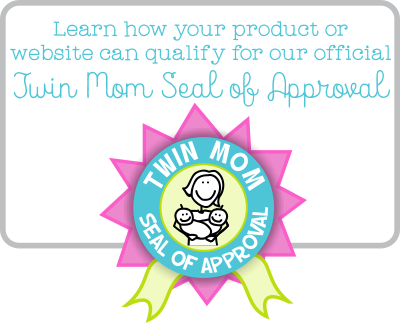Things to Consider During a Twin Pregnancy
A (Beautiful) Gigantic Belly, Truckloads of Diapers and Two Sweet Angels to Love
"Two heartbeats? Two babies? Two cribs, two car seats, two college
tuitions..." These may have been the first panic-stricken thoughts you
had when you first found out you were carrying more than one baby. There
are many things to consider when carrying multiples to make sure you
not only enjoy this amazing experience, but to help you have a healthier
pregnancy with plump babies.
Multiples Equals The Risk of a Preemie
Almost 60% of twins arrive too soon (or prior to full term, i.e. 37
weeks gestation). Only about 8% of twins are born before 32 weeks (or
very preterm), while 48% are born between 32 to 36 weeks, and 44% at
term or later. The good news is that even though they're coming earlier,
they have a higher chance of surviving today than they did 20 years
ago.
Of Special Concern for a High-Risk Multiple Pregnancy
Know the Signs of Preterm Labor (PTL)
PTL is when you experience regular contractions of the uterus AND
changes to your cervix before 37 weeks. Since we know that twins
sometimes want to make their entrance early, it's important to pay
attention to your body and recognize the possible early signs of labor.
These contractions differ from Braxton Hicks (BH) contractions, as BH's
tend to be irregular and do NOT cause changes to the cervix. It can be
hard to tell the difference between the two, so I suggest that if you
have any concerns, call your doctor. Never be embarrassed to ask, even
if it's only to seek reassurance.
Preterm contractions show themselves in many different ways. They may not always be painful, and can feel like just a tightening or even a tingling sensation in your stomach. Other signs are: more trips to the bathroom (increased "number twos" and diarrhea), period-like cramping, lower back pains (which can easily be confused with normal pregnancy pains), heaviness or pressure in your stomach, "lady area," or butt, or a change in your discharge. You may even just feel a bit off. These can be very hard symptoms to pinpoint, so be on the lookout, and tune into your body. Even if you sense something is not right - have it checked out!
Understanding Cervical Length - A Preemie Predictor
The shorter your cervix, the greater the risk. Length should be
determined using transvaginal ultrasound (TVU), not via finger guessing.
A cervical length of 2.5cm or less is considered short and puts you at
risk for a preemie.
A measurement of 2 to 3 cm with a positive Fetal Fibronectin result
(FFN, a swab test used to help "predict" the likelihood that you will
deliver within 7-10 days) also puts you at an increased risk. (Using
both FFN results AND cervical length are best.) Even if you are having
contractions, but your cervix is staying nice and long, you should feel
reassured that you get more time to sleep before night feedings start
Vaginal Progesterone
For women carrying twins AND who have a prior history of preterm
birth, they should consider getting 17 Alpha-Hydroxyprogesterone
Caproate (aka 17P or progesterone) injections. This is a hormone which
is shown to reduce early birth by 33%. It is NOT recommended for every pregnant woman who is carrying multiples.
For women without a past history, i.e. low-risk women, who show cervical
shortening of <2.5 cm, vaginal progesterone has been shown to reduce
the rate of babies coming before 34 weeks by 45%. Even with a
shortening cervix, vaginal progesterone can extend pregnancies and help
us to have healthier babies.
Note: Cerclages (transvaginal) are not recommended as a standard for
women carrying multiples, but should be considered if the woman has a
history consistent with an incompetent cervix, such as second trimester
loss(es), LEEP or other cervical surgeries, etc.
Multiples = Automatic Bed Rest
Many people think that just because you are carrying multiples, it means
you're automatically confined to bed jail. (I spent 4.5 months on bed
rest and it was awful.) This is not true. Routine bed rest
has actually been shown to cause harm and babies coming earlier. For
those of you who do get put on bed rest due to preterm labor,
preeclampsia or other reason, hang in there! You can do this. (Note: As
the benefits of bed rest have not been proven, many doctors are now
limiting the use of bed rest during pregnancy.)
Twin-to-Twin Transfusion Syndrome
This very serious condition affects identical twin pregnancies. This
syndrome happens when the blood flow is uneven and goes through one
twin, the donor, then to the other twin, the recipient. The donor twin
typically has very little amniotic fluid and often doesn't grow well.
The recipient twin has lots of fluid, causing a swollen bladder among
other issues. A bladder that is bigger in one baby on ultrasound is an
early sign. The risk of death for both babies without treatment is very
high. Fifteen weeks is considered an important time to get checked in
order to predict, with accuracy, whether your babies will suffer from
this. The most severe cases typically develop between 16 and 18 weeks.
ALL women carrying identical twins must be screened at around 15 weeks.
Laser surgery has shown great promise in saving TTTS babies. Amnioreduction is another treatment commonly used.
Flaunt Your Stuff
Even though your skin is stretched beyond belief, your back hurts all
the time, you're stressed and fear the early arrival of your
babies...you must try to enjoy this time. Flaunt what you got, girls!
Enjoy this amazing time.
About the Author
Kelly Whitehead is a scientist-mom who lost a son at 23 weeks, then went
on to have two high-risk pregnancies to have her children today. During
this time, in which she struggled to make medical decisions and manage
her feelings, she realized there were no books that covered what she
needed - so she wrote one herself in order to help others.
She is a spokesperson for Sidelines and a birth doula. Her passion is
to help families through the journey to reach parenthood.
See Book Review for Kelly Whitehead's Why Me? - Understanding and Managing a Potential Preterm Pregnancy which can be purchased on amazon.com

Recent Articles
-
Double Duty Log Book For Twins - An easy way to keep track
Apr 11, 24 06:18 PM
Our Double Duty Log Book for Twins will help you stay on schedule, keep track of feedings and more. Save your sanity and get it all done with a twin log sheet that really works! -
37 weeks+4days and feeling huge
Sep 14, 23 12:12 PM
I am expecting a boy and girl.❤️ My belly is massive,it’s 3 times bigger than my previous pregnancy.My bum has also gotten bigger(My hubby loves it)!I -
Foods Babies Should Avoid
Jan 12, 23 06:30 PM
Foods Babies Should Avoid is a part of our feeding twins guide





Comments or Questions?
Join the conversation. We love to hear from our readers!